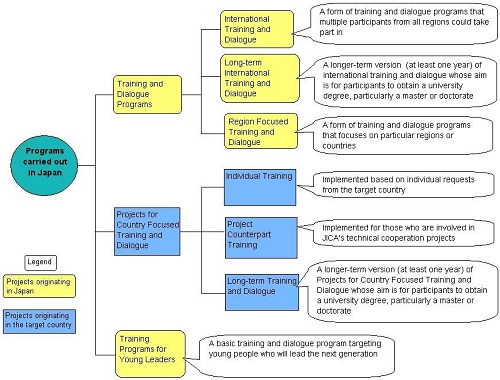Training in Japan as technical cooperation
JICA's Knowledge Co-Creation Programs (KCCP) are a form of technical cooperation that JICA carries out in Japan. Much of the knowledge accumulated in Japanese society can be understood only by actually visiting Japan. An example of this is the unique way of forming social systems and organizational structures, the so-called "Japanese model." If "seeing is believing," then experiencing is understanding. By actually visiting Japan, people from developing countries come to a setting surrounded by Japanese society and its organizations, where they can discuss the hardships in their home countries and develop an understanding of social conditions and values very different from their own. This experience imparts valuable knowledge that could be obtained in no other way.
In addition to providing unique knowledge, this sort of technical cooperation stimulates people to draw inferences on their own, which is crucial element for human resource development along with other assistance schemes. JICA's KCCP are therefore a major component of Japan's international cooperation programs, receiving nearly 10 thousand participants each year. The majority of the participants are affiliated with a governmental or public organization, though the number of people from non-governmental organizations (NGOs) has been increasing in recent years.
In terms of scale and available resources, there is no other program in the world that can compare to JICA's KCCP, which have become one of the cornerstones of Japan's international cooperation.
Program Variety
JICA's KCCP are divided mainly into three categories. 1) Projects for Country Focused Training and Dialogue are carried out in response to a specific request from a developing country. 2) Training and Dialogue Programs originate as a proposal from Japan to a developing country and are carried out only after a corresponding request is received. 3) Training Program for Young Leaders, which focus on training young leaders to lead the next generation. More than five hundred KCCP are held each year, focusing on a wide range of topics. In Japanese Fiscal Year 2016, over 10 thousand people from some 150 nations came to Japan to participate in KCCP. More detailed variety of the KCCP can be viewed here:

Japan's Experience as a Developing Country
Japan has a history of fusing its national character with learning from other countries. Through a process of trial and error, Japan has adopted foreign knowledge and technology, becoming proficient at adapting it to the particular circumstances in Japan. The concept is summed up in the phrase "wakon yosai", meaning "Japanese spirit, Western learning." Although all nations borrow and apply foreign knowledge, Japan's experience in doing so is particularly unique and includes many lessons that may be useful to the people of developing countries who are seeking to build their own nation to embrace globalization. JICA's KCCP are expected to play an increasingly important role in Japan's international cooperation as a means to effectively transmit Japan's unique experiences.





scroll